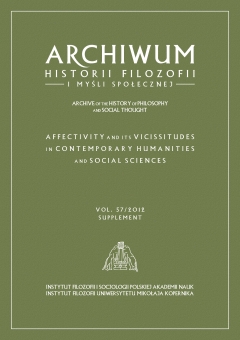Rationality and Affectivity in Politics – the Role of Fear and Hysteria in the Political Thought of István Bibó
Rationality and Affectivity in Politics – the Role of Fear and Hysteria in the Political Thought of István Bibó
Author(s): Gábor KovácsSubject(s): Politics, Political Philosophy, Philosophy of History
Published by: Instytut Filozofii i Socjologii Polskiej Akademii Nauk
Keywords: Fear; hysteria; problem-solving community; national characterology; deadlock;
Summary/Abstract: István Bibó’s oeuvre deals with the problems of modern politics distorted by emotions and political hysteria. Modern nation, in his theory, is a political problem-solving community. In this respect his approach runs parallel with Karl Popper’s theory. The political thought of Bibó is embedded in a philosophy of history whose central notion is fear. The unique historical achievement of European civilization, according to Bibó, is the overcome of fear by the virtue of the institutions of modern political democracy. But democracy is a fragile phenomenon; in some historical constellation it collapses and sinks into the vortex of fear and communal hysteria. These are the main topics my paper deals with.
Journal: Archiwum Historii Filozofii i Myśli Społecznej
- Issue Year: 2012
- Issue No: 57supl.
- Page Range: 65-82
- Page Count: 18
- Language: English

